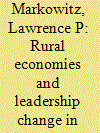|
|
|
Sort Order |
|
|
|
Items / Page
|
|
|
|
|
|
|
| Srl | Item |
| 1 |
ID:
083595


|
|
|
|
|
| Publication |
2008.
|
| Summary/Abstract |
Examining the politics of local-level extraction in Uzbekistan, this article identifies the emergence of two rent-seeking strategies among local prokurators. Using case study material from Samarkand Province and Navoii Province, it demonstrates how concentrated economic resources under rural elites and dense patronage ties to regional politicians determine the limits placed on rent seeking. As this analysis seeks to emphasize, state capabilities within Uzbekistan's territorial infrastructure, and their effects on extraction, are multi-faceted, highly fluid, and intimately local
|
|
|
|
|
|
|
|
|
|
|
|
|
|
|
|
| 2 |
ID:
152875


|
|
|
|
|
| Summary/Abstract |
It is often noted in resource curse literature that agricultural economies are less conflict-prone than countries managing mobile, high-value resources. In the vast literature linking resource endowment and conflict, cash crop economies are often considered immune to civil violence, believed to stand apart from the many horrific episodes of violence and civil war centered on “lootable” wealth (such as alluvial diamonds, tin, tungsten, or other conflict minerals). But many incidents of violence—especially local violence—are in fact occurring in cash crop economies. Drawing on newspaper accounts, policy analyses, ethnographic interviews, and in-depth reports by international organizations, I examine an episode of local violence in 2010 in Kyrgyzstan. Through this case study, the article provides a better understanding of local violence in cash crop economies that can apply to other weak states.
|
|
|
|
|
|
|
|
|
|
|
|
|
|
|
|
| 3 |
ID:
149737


|
|
|
|
|
| Summary/Abstract |
This article applies a political economy approach to questions of presidential succession in Central Asia. Using the cases of Uzbekistan and Kyrgyzstan, it examines how institutions governing rural economies generate, channel and distribute rents within these authoritarian regimes. In some, these institutions concentrate rents under long-standing rulers; in others they diffuse rents away from rulers. The article then specifies obstacles to leadership change that arise from these rural economies, and the crises those obstacles may pose for authoritarian regimes in the region.
|
|
|
|
|
|
|
|
|
|
|
|
|
|
|
|
| 4 |
ID:
181822


|
|
|
|
|
| Summary/Abstract |
This article surveys research on regimes and states in Central Asia and assesses its contribution to Political Science, specifically the subfield of comparative politics. It discusses three areas in which research on the region has been influenced by and, in turn, fruitfully shaped the comparative political analysis of state and regime: a turn from macro- to micro-level topics; innovations in research design; and the embrace of interdisciplinarity. It then addresses the challenges confronting scholars of the region, including uneven theoretical contributions to comparative politics and impediments in the feasibility of field research. It identifies several lively debates in comparative politics to which Central Asianists have the potential to contribute important insights. It concludes that the study of states and regimes in Central Asia has greatly enriched some debates in comparative politics (and vice versa), but declining pools of funding, the politicization of academic research, and unequal access to institutional resources among local and Western scholars threaten to diminish the field’s contributions in the coming years.
|
|
|
|
|
|
|
|
|
|
|
|
|
|
|
|
|
|
|
|
|